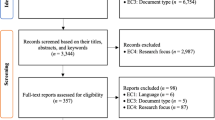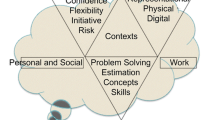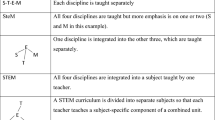Abstract
In this paper, we expand our prior work on mathematics education in contexts of language diversity by elaborating on the three perspectives on language described by Ruiz (NABE J 8(2):15–34, 1984): language-as-right, language-as-resource, and language-as-problem. We illustrate our arguments with data taken from research contexts in Catalonia-Spain and South Africa. In these two parts of the world, the language policy in education has long been an issue, with a monolingual orientation that values one language (i.e., Catalan in Catalonia and English in South Africa) over others. Throughout the introduction of specific examples of policy documents, classroom practices, and participants’ reports, our main point is that the right of using the students’ languages makes sense because it is itself more than an intrinsic human right; it is an option that potentially benefits the creation of mathematics learning opportunities. Especially for the instances of classroom practices, our examples can be considered as representative in that they point to a common situation in our data: despite the fact of the language of learning and teaching being fixed, there is room for the learners and the teacher to take or react to a decision on what language to use, with whom, and how in concrete moments of the interaction. However, on the basis of our studies and drawing on the literature in mathematics education and language diversity, we argue that language rights are not sufficiently connected to language as a pedagogical resource. The enactment of these rights is still contributing in many ways to the social and political construction of problems concerning the role of certain languages in classroom interaction. We conclude the paper by discussing some possibilities for framing language as a resource that provide effective support to all students’ learning of mathematics.
Similar content being viewed by others
Notes
An official policy of racial segregation formerly practiced in the Republic of South Africa, involving political, legal, and economic discrimination against non-whites.
References
Chitera, N. (2011). Language of learning and teaching in schools: an issue for research in mathematics teacher education? Journal of Mathematics Teacher Education, 14(3), 231–246.
Chval, K. B., & Khisty, L. L. (2009). Bilingual Latino students, writing and mathematics: A case study of successful teaching and learning. In R. Barwell (Ed.), Multilingualism in mathematics classrooms: Global perspectives (pp. 128–144). Clevedon: Multilingual Matters.
Civil, M. (2012). Mathematics teaching and learning of immigrant students. In O. Skovsmose & B. Greer (Eds.), Opening the cage: Critique and politics of mathematics education (pp. 127–142). Rotterdam: Sense.
Civil, M., & Planas, N. (2012). Whose language is it? Reflections on mathematics education and language diversity from two contexts. In S. Mukhopadhyay & W.-H. Roth (Eds.), Alternative forms of knowing (in) mathematics: Celebrations of diversity of mathematical practices (pp. 71–89). Rotterdam: Sense.
Howie, S. J. (2003). Language and other background factors affecting secondary pupils’ performance in mathematics in South Africa. African Journal of Research in Science, Mathematics and Technology Education, 7, 1–20.
Jaffe, A. (2007). Code-switching and stance: issues in interpretation. Journal of Language, Identity and Education, 6(1), 53–77.
Moschkovich, J. N. (2002). A situated and sociocultural perspective on bilingual mathematics learners. Mathematical Thinking and Learning, 4(2–3), 189–212.
Nkambule, T., Setati, M., & Duma, B. (2009). One mathematics classroom, multiple languages. In M. F. Pinto & T. Kawasaki (Eds.), Proceedings of the 34th Conference of the International Group for the Psychology of Mathematics Education (Vol. 3, pp. 345–352). Belo Horizonte, Brazil: PME.
Owen-Smith, M. (2010). The language challenge in the classroom: a serious shift in thinking and action is needed. Focus: Journal of the Helen Suzman Foundation, 56, 31–37.
Owen-Smith, M. (2012). Overcoming inequality in South Africa through multi-bilingual education: A set of teaching methodologies. Paper presented at the Conference ‘Towards Carnegie III’, University of Cape Town, South Africa, 3–7 September 2012.
Planas, N. (2011). Language identities in students’ writings about group work in their mathematics classroom. Language and Education, 25(2), 129–146.
Planas, N. (2014). One speaker, two languages: learning opportunities in the mathematics classroom. Educational Studies in Mathematics,. doi:10.1007/s10649-014-9553-3.
Planas, N., & Civil, M. (2013). Language-as-resource and language-as-political: tensions in the bilingual mathematics classroom. Mathematics Education Research Journal, 25(3), 367–381.
Planas, N., & Setati, M. (2009). Bilingual students using their languages in their learning of mathematics. Mathematics Education Research Journal, 21(3), 36–59.
Republic of South Africa (RSA) (1996). Constitution of the RSA, 1996 (Act No. 108 of 1996).
Ricento, T. (2005). Problems with the ‘language-as-resource’ discourse in the promotion of heritage languages in the USA. Journal of Sociolinguistics, 9(3), 348–368.
Ruiz, R. (1984). Orientations in language planning. NABE Journal, 8(2), 15–34.
Setati, M. (2005). Mathematics education and language: policy, practice and research in multilingual South Africa. In C. Keitel, J. Adler, & R. Vithal (Eds.), Mathematics education research in South Africa: Challenges and possibilities (pp. 73–109). Pretoria: HSRC.
Setati, M. (2008). Access to mathematics versus access to the language of power: the struggle in multilingual classrooms. South African Journal of Education, 28(1), 103–116.
Setati, M., Molefe, T., & Langa, M. (2008). Using language as a transparent resource in the teaching and learning of mathematics in a Grade 11 multilingual classroom. Pythagoras, 67, 14–25.
Setati, M., & Planas, N. (2012). Mathematics education across two different language contexts: a political perspective. In O. Skovsmose & B. Greer (Eds.), Opening the cage: Critique and politics of mathematics education (pp. 167–186). Rotterdam: Sense.
Turner, E. E., Domínguez, H., Empson, S., & Maldonado, L. A. (2013). Latino/a bilinguals and their teachers developing a shared communicative space. Educational Studies in Mathematics, 84(3), 349–370.
Vallcorba, J. (2010). El Pla per a la llengua i la cohesió social a l’educació [Plan for the language and social cohesion in education]. Barcelona: Generalitat de Catalunya.
Acknowledgments
We are grateful to the Spanish Ministry of Economy and Competitivity for funding Project EDU-2012-31464, and to the Catalan Institution for Research and Advanced Studies for funding Núria Planas’ ICREA Professorship. The work presented in this paper was also supported by the National Research Foundation in South Africa—Grant 85856, Reference IFR13022717721. Any ideas expressed are, however, those of the authors and therefore neither the Ministry of Economy and Competitivity nor the National Research Foundation accept any liability.
Author information
Authors and Affiliations
Corresponding author
Rights and permissions
About this article
Cite this article
Planas, N., Setati-Phakeng, M. On the process of gaining language as a resource in mathematics education. ZDM Mathematics Education 46, 883–893 (2014). https://doi.org/10.1007/s11858-014-0610-2
Accepted:
Published:
Issue Date:
DOI: https://doi.org/10.1007/s11858-014-0610-2




